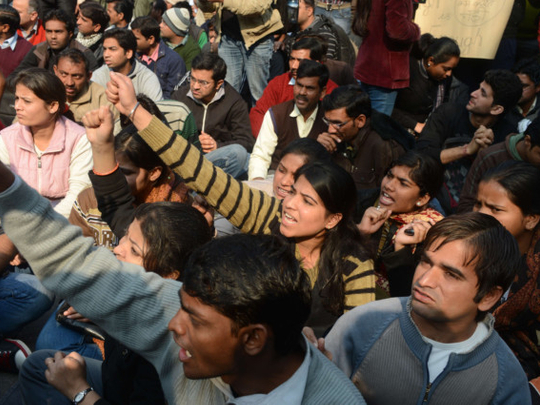
The young gang-rape victim, who died last Saturday in a Singapore hospital, rendered there by an Indian government unnerved by her catalytic power, is unlikely to have aspired to the multiple campaigning names bestowed upon her. “Nirbhaya” (fearless), “Jagruti” (awakening), “Amanat” (precious possession for safe-keeping) or “Damini” (lightning) mainly wanted, as she said, “to live”. Being gang-raped and eviscerated on privatised and poorly-regulated mass transport is not how she would have envisaged the end of an evening with a friend at the cinema. As she lay dying, however, she became a rallying point for protests that have erupted across urban India and generated undeniably powerful collective outrage. Thousands of people, including young men, have taken to the streets to demand gender justice and equality from a state that has all too often emerged as indifferent to, or even complicit in, misogynist violence. A poem circulated by feminist campaigners asks trenchantly: “What clothes — pulled from what rack / Will prevent an attack?” After all, many of us have been molested on Delhi buses while in saris.
Even as residents of Delhi and other cities have come together in an unusual show of collective will, the protests have raised difficult questions. Some note that beyond holding the state and police to account, Indians have to confront deeply entrenched patriarchal views as well as a popular culture which, as in western countries, continues to objectify female sexuality — creating an environment where harassment and violence are regularised as part of the sexual game. Without pandering to the predictable and false accusation that women’s rights are an elite issue, any long-term movement arising from this tragedy will also have to think seriously about how the outrage that was galvanised by a brutal assault on a victim, thought of as young and middle-class, can also be directed at making more visible and equally unacceptable, a wider spectrum of sexual violence. It encompasses domestic violence, the rape of poor women, “tribals” and Dalits and sexual assault by policemen and soldiers in conflicts in the Indian north-east, Kashmir and Chhattisgarh.
While citizens of diverse affiliations have coalesced around the issue of women’s safety, significant fissures have also emerged. One comes out of the demand, made even before the case turned into one of murder, that the rapists be given the death penalty, which is reserved in India for the rarest of rare cases. Progressive voices have been quick to distance themselves from a lynch-mob mentality. However, the division itself speaks to the appeal, for much of the Indian middle-class, of strong leadership. In this light, the recent electoral triumph in Gujarat of the iconic strongman with prime ministerial aspirations, Narendra Modi, who stands accused of presiding over murderous religious violence that involved the mass rape of Muslim women, is sobering.
The obsession with wealth accumulation in India has also widened a dangerous economic gap between classes. It is not remotely to justify the recent brutality, in which the accused come from the ranks of the working poor, to suggest that any analysis of “rape culture” should include consideration of the ways in which growing class rage can get displaced on to the bodies of women. Regarded as one of the most dangerous places in the world for women, India is also home to a strong tradition of democratic struggles for women’s rights, resulting in both progressive legislation and gradual social change in relation to dowry, criminal law, inheritance, health and workplace rights. Such struggles — and social justice — must now prevail.
— Guardian News & Media Ltd
Priyamvada Gopal teaches in the faculty of English at Cambridge University.










